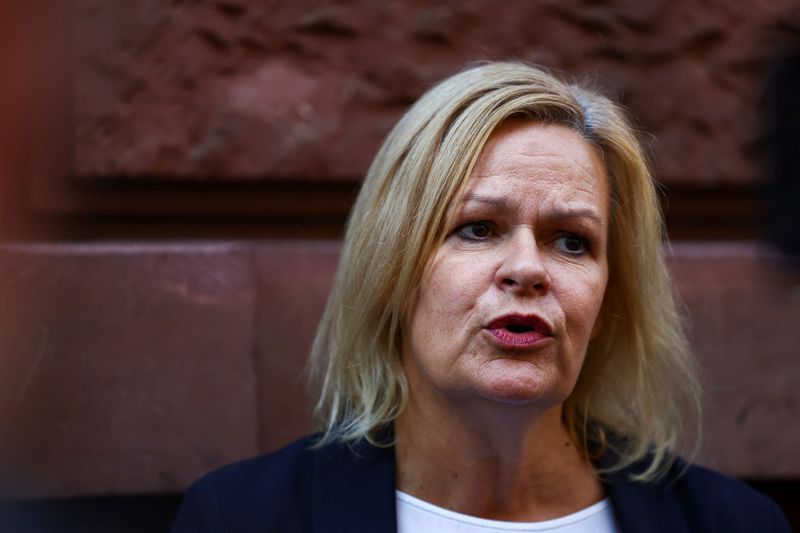By Sarah Marsh
BERLIN (Reuters) - Germany will enforce stronger border controls with Poland and the Czech Republic to help fight human trafficking, the country's interior minister said on Tuesday as a migration surge fuels support for the far-right ahead of local elections.
The country has taken in around 1 million Ukrainian refugees over the past year, with non-Ukraine related asylum requests rising sharply. Local authorities say they are building new housing but are struggling to keep up with the demand.
Worries over migration have helped place the far-right, anti-migrant Alternative for Germany (AfD) party second in nationwide polling and first in the country's east, ahead of Oct. 8 elections in the country's Hesse and Bavaria states.
In an interview with broadcaster Deutschlandfunk, Interior Minister Nancy Faeser, a member of Chancellor Olaf Scholz's centre-left Social Democrats (SPD), said Germany would set up stationary border controls with Poland and the Czech Republic.
"We will prepare stronger border controls to better fight human traffickers," said Faeser, who is running in the Oct. 8 vote to be Hesse's state premier.
Faeser did not say when the new measures would be implemented. Politico reported the new controls would be formally announced on Wednesday. The interior ministry did not respond to a request for comment.
Scholz, whose party is trailing in polls in Hesse, hinted last week that Germany could take steps to strengthen the border with Poland after calling on the Polish government to clarify allegations about a cash-for-visas deal for migrants.
The issue is set to become a point of contention for Scholz's fractious three-way coalition, with leading politicians from junior coalition partners the Greens and liberals on Tuesday expressing their scepticism with Faeser's border plan.
Germany has maintained stationary controls on the Bavarian border with Austria since the European migrant crisis in 2015 when more than 1 million migrants arrived in the country, many fleeing war in the Middle East.

Then-Chancellor Angela Merkel, a conservative, was praised for her policy at the time. Critics say it has helped fuel the far-right AfD's rise.
The AfD currently stands to win in three regional elections in eastern Germany next year, polling 32-35% there and 21% nationwide.
